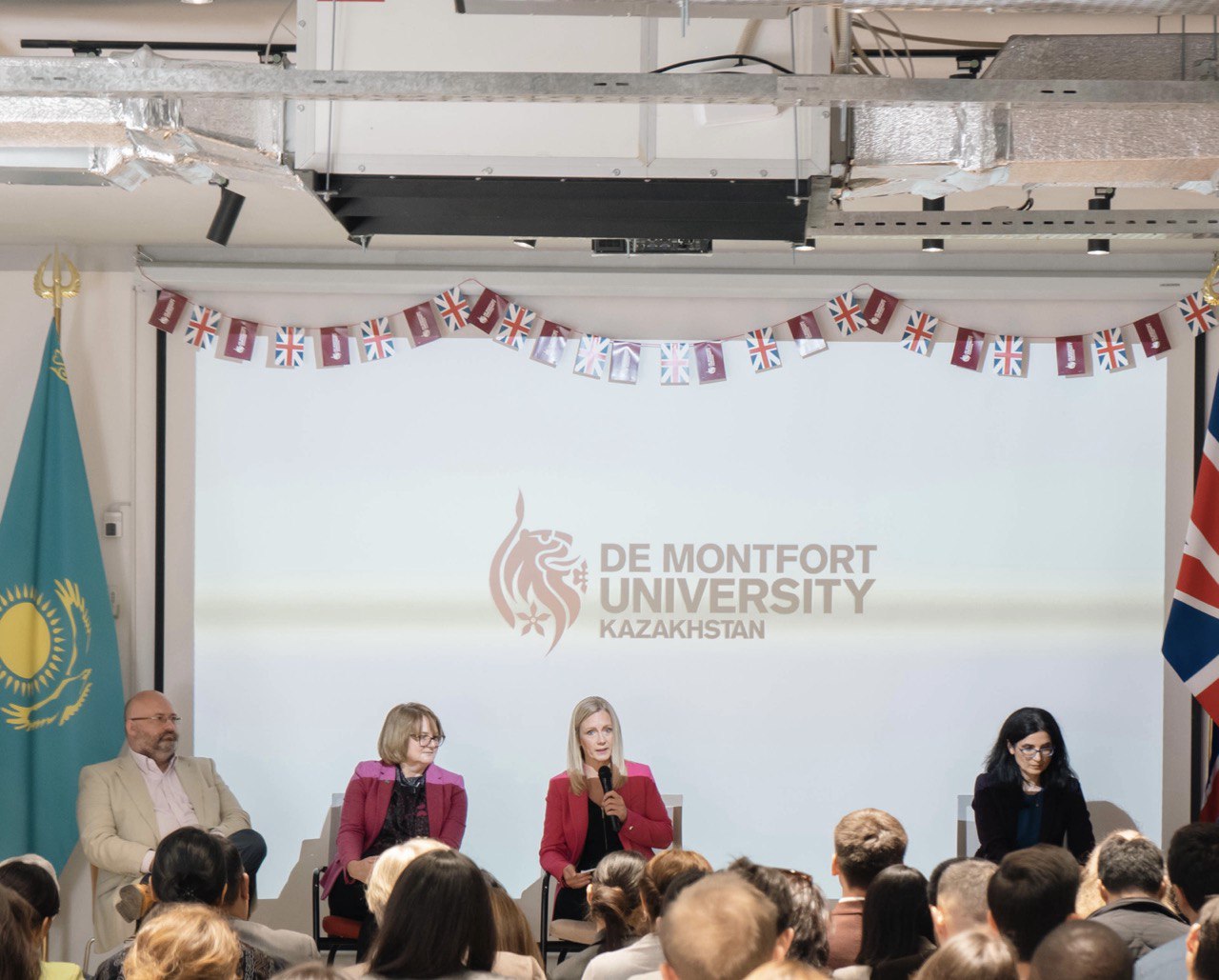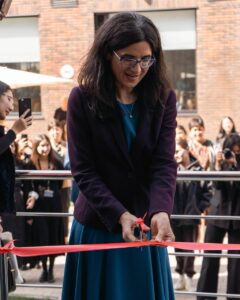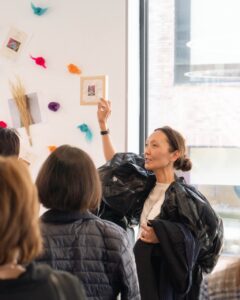ASTANA – De Montfort University Kazakhstan (DMUK) unveiled its creative hub in Almaty on Sept. 22, poised to play a crucial role in nurturing the creative industry in the country. The hub, named DMUKreative Hub, will be a wellspring of resources, expertise and opportunities in the creative industry, fostering academic collaborations and creative talents, said DMUK President Sakina Zafar in her interview with The Astana Times.

The opening ceremony of the DMUK Hub. Photo credit: DMUK
The hub is located at DMUK, which opened the campus in the heart of Almaty in September 2021. DMUK is a partnership between EdPeritus UK and De Montfort University, a leading U.K. university with over 150 years of history.
“The aim was to provide a platform where students, faculty, and industry professionals could collaborate, innovate, and create meaningful connections,” said Zafar. “The hub serves as a space where students can explore their creativity, develop their skills, and gain practical experience that is vital for their future careers in the creative industries.”
According to Zafar, the potential for developing creative industries among Kazakhstan’s students and youth is enormous.
“Kazakhstan’s students and youth have shown a tremendous passion and talent for various forms of creative expression, be it art, design, music, film, or literature. Their cultural diversity, unique perspectives, and innovative ideas can contribute significantly to the growth and development of creative industries in Kazakhstan,” she noted.

Sakin Zafar cuts the ribbon during the opening ceremony of the hub. Photo credit: DMUK
Opportunities offered by the hub
Aika Alemi, director of the hub and a Kazakh fashion designer, stressed that the hub “goes beyond the surface.” It offers incubator programs, short courses, mentorship programs, and accelerators focused on market readiness, e-commerce, and exports.
Educational programs will feature courses on such topics as fashion & style, urbanism, media, advertising, music and tech from established leaders in the field.
“A dedicated platform connects these startups with investors and partners, ensuring sustainable growth. Moreover, the hub acts as a community hub, fostering collaboration among creative minds through events like meet-ups, conferences, and social media engagement,” Alemi told The Astana Times.
The hub plans to invite both global and regional specialists and mentors from diverse fields such as marketing, sales, film, fashion, music, media, contemporary art, and digital technology. This will foster a comprehensive environment for nurturing skills and fostering innovation.

Aika Alemi is a Kazakh fashion designer. Photo credit: DMUK
Alemi said the initiative will have a significant impact not only on Kazakhstan but also on the entire Central Asia region.
“DMUKreative Hub extends its resources and opportunities to individuals and organizations across Kazakhstan and Central Asia through a multifaceted approach. It empowers artists, scientists, innovators, inventors, and entrepreneurs by enhancing their commercial skills and offering tailored training and coaching, including on-the-job coaching, targeted courses, internships, case studies, and volunteer projects,” she explained.
Potential for increased cooperation in the creative economy
Collaboration between the U.K. and Kazakhstan is “truly promising,” particularly in the creative and social sectors, said Kathy Leach, the British Ambassador to Kazakhstan.
“Since 2014, the British Council has been playing a strong role in nurturing creativity and innovation in Kazakhstan’s ever-evolving cultural landscape, with a specific focus on the creative economy. Its mission revolves around enlightening policy-makers and leaders in the cultural and creative sectors about the immense potential of the creative economy,” Ambassador Leach told The Astana Times.
The British Council’s Supporting the Creative Economy project is one of the examples of how collaboration makes a difference.
The project offers a four-week online learning program designed specifically for professionals in the cultural and creative sectors across Central Asia, with a particular focus on policy development. It is implemented with Cultural Oxford Associates, a management consultancy and entrepreneurial business thinking firm for the cultural and creative sectors.
Nearly 300 participants joined the program during the past summer. The British Council is now working on the second cohort of the program.
The ambassador emphasized the importance of building connections within the professional community. “This program provides a platform for creative industry professionals to engage, collaborate, and learn together,” she added.

Ambassador Kathy Leach cuts the ribbon during the hub’s opening ceremony. Photo credit: DMUK
Another initiative, called Creative Central Asia, kicked off in 2017, cultivating a community of leaders through annual international conferences in Central Asia.
“One notable achievement of their efforts is the Creative Producers program, which was launched in Kazakhstan in 2019. This initiative recognizes the need for skilled arts practitioners to transcend traditional roles, acting as bridges between arts, creative industries, and various partners,” said Ambassador Leach.
The program has supported more than 40 up-and-coming creative producers through mentorship and financial grants, culminating in the Styq Festival in Almaty in 2021. The festival featured the work of 68 artists and producers who created 13 projects across 14 arts spaces in Almaty.
“This transformative journey has empowered individuals like Ruslan Yakupov, founder of the Qazaq Indie music collective, to launch his own music label,” she added.
Ambassador Leach also mentioned the Creative Spark Higher Education Enterprise Program, which took place from 2018 to 2023 across seven countries, including Kazakhstan.
The program facilitated nine partnerships between British institutions and colleges and creative organizations in Kazakhstan. Twenty-four courses opened in Kazakhstan, encompassing a diverse array of topics related to creative entrepreneurship.
“From entrepreneurship at Kazakh-British Technical University to fashion business at AlmaU [Almaty Management University], these courses have enriched the educational landscape,” said the ambassador.
The program’s impact reached the regions, contributing to the development of hubs for young entrepreneurs, such as the Kazakh-American Free University hub in Oskemen.
“One notable outcome of the program is the introduction of an innovative course on Creative Entrepreneurship at Zhurgenev Academy of Arts, thanks to a partnership with Impact Hub Almaty and Goldsmiths University,” she said.
Creative industry development – priority for Kazakhstan
The development of creative industries has been on the national agenda for a while. In 2021, the government approved the concept for the development of creative industries until 2025. The list of activities classified under the creative industry was determined in June 2023.
According to the Kazakh Ministry of National Economy, 95,000 people are employed in the creative industries. Investments in fixed assets reach 33.3 billion tenge ($69.3 million).
There are 32,000 active business entities in the creative industries, which contribute 2.7% to the economy. This is close to the global GDP contribution from creative industries, which is slightly above 3%. In certain developed nations, this figure can soar to as much as 12%.
The growth of the creative industry has been a recurring topic for President Kassym-Jomart Tokayev. In his state-of-the-nation address on Sept. 1, he described the creative industries as the “driving force behind the development of large cities that attract talented and creative individuals.”
Ambassador Kathy Leach commended the nation’s ambitious goal. “President Tokayev’s recent state-of-the-nation address underscored the crucial task of developing the creative industry, and it’s indeed an ambitious goal,” she said.
“President Tokayev’s ambitious goal presents a promising opportunity, and with collective efforts, we are well-positioned to help Kazakhstan’s creative industry grow,” said the ambassador.
She offered the British Council’s expertise in helping Kazakhstan expand its creative landscape, saying it “offers a unique perspective.” In 2018, the British Council created the first-ever map of сreative industries in Kazakhstan.
“The organization works closely with policymakers, sharing U.K. expertise and experiences to support the government’s strategic efforts, ensuring that the conditions are conducive for creative individuals and organizations to thrive and bring about meaningful, sustainable change,” said Ambassador Leach.
She further noted that the British Council emerged as a key player in Central Asia’s creative economy landscape, foreseeing its continuous involvement in forging lasting connections between Kazakhstan and the U.K. in this domain.

